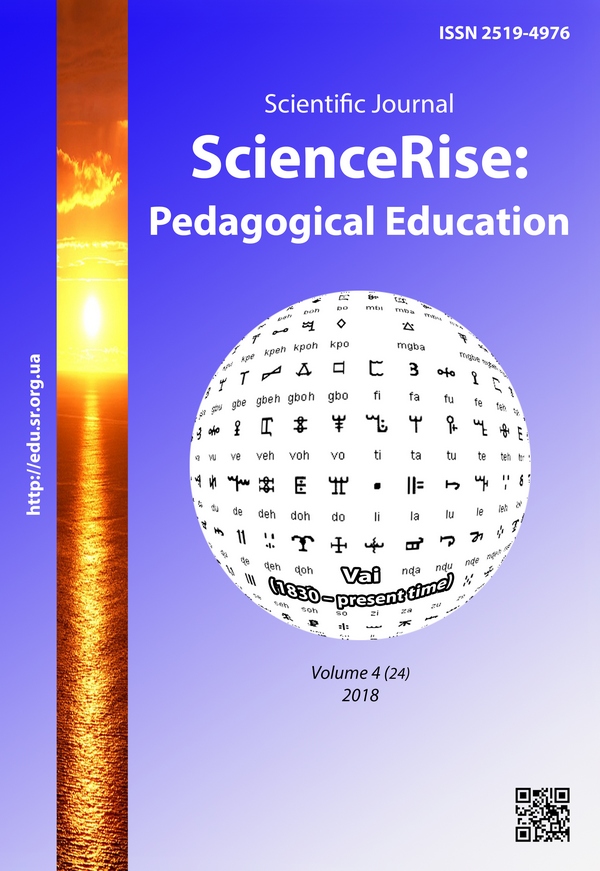The modern state of future doctor preparation in the Great Britain: comparative and pedagogical aspects
DOI:
https://doi.org/10.15587/2519-4984.2018.132531Keywords:
future physicians, model of education, medical education of Great Britain, professional trainingAbstract
The article analyzes the current state of preparation of future British doctors in pedagogical and medical scientific literature. A number of peculiarities of educational processes in higher educational establishments of the Great Britain are outlined, a comparative analysis of professional training of specialists at medical universities has been carried out. There are a number of factors influencing the training of future doctors in higher educational institutions. It is noted that the General Medical Council approved the competencies and responsibilities of the doctor, these criteria are set out in the document "Good medical practice", the main idea of these standards is patient’s safety and high quality of medical services. Standards are presented in four areas: knowledge, skills and execution; safety and quality; communication, partnership and teamwork; trust support. Each of these sections contains paragraphs with recommendations and explanations for doctors behaving in a particular situation that may arise in the process of communicating and treating the patient, and suggests possible ways to resolve misunderstandings and conflicts.
The emphasis is placed on the GMC General Health Board managing a quality assurance program that assesses how well the standards implemented by health schools are being effectively implemented. The General Medical Council also approves and evaluates postgraduate education, specialization, including the training of general practitioners and sub-specialist training; approves postgraduate programs.
The article notes that the characteristic feature of education in Great Britain is the understanding of foreign-language professional communication as an integral component of foreign language education, which has certain regularities that are in the sight of specialists and implement reforms in its content and technology of functioning. The concept of professional foreign language communication is considered as a special interpersonal professional interaction in the field of informational and cognitive contact, which involves the exchange of information taking into account the possibilities of cognitive and emotional influences on the interlocutor
References
- Standarty medychnoi osvity y profesiinoi pidhotovky u Velykii Brytanii. Available at: https://en.wikipedia.org/wiki/Medical_education_in_the_United_Kingdom
- Krasylnykova, H. (2014). Systema monitorynhu yakosti vyshchoi osvity v universytetakh Velykoi Brytanii: dosvid dlia Ukrainy. Porivnialna profesiina pedahohika, 4 (3), 138–144.
- Lohush, L. H. (2016). Tendentsii rozvytku medychnoi osvity v osvitnii politytsi Yevropeiskoho Soiuzu. Kyiv, 239.
- Palamarenko, I. O. (2012). Profesiina pidhotovka simeinykh likariv u vyshchykh medychnykh shkolakh Velykoi Brytanii. Kyiv, 20.
- Arapov, M. V. (2004). Meditsina i meditsinskoe obrazovanie. Energiya: ekonomika, tekhnika, ekologiya. URL: http://naukarus.com/meditsina-i-meditsinskoe-obrazovanie
- Verification of the compatibility of The framework for higher education qualifications in England, Wales and Northern Ireland (FHEQ) with the Framework for Qualifications of the European Higher Education Area (FQ-EHEA) (2008). Report of the FHEQ Self-certification Advisory Group, 65. Available at: http://www.qaa.ac.uk/en/Publications/Documents/Verification-of-the-compatibility-of-The-framework-for-higher-education-qualifications-in-England--Wales-and-Northern-Irel.pdf
- The UK Quality Code for Higher Education. Available at: www.qaa.ac.uk/qualitycode
- Assuring standards and quality. Available at: www.qaa.ac.uk/assuringstandardsandquality/qu
- Zinkovskyi, Yu. (2010). Standartyzatsiia osvity yak imperatyv reformuvannia vyshchoi shkoly. Vyshcha shkola, 1, 24–31.
- Verkhohliad, O., Romanovska, Yu., Romanovskyi, O. (2010). Problemy mizhnarodnoi spivpratsi u sferi vyshchoi osvity: kontrol za yakistiu osvity. Natsionalnyi i mizhnarodnyi aspekty. Vyshcha shkola, 1, 15–24.
- Quality and standards in UK universities: A guide to how the system works. Quality Assurance Agency for Higher Education (QAA). Available at: http://dera.ioe.ac.uk/26289/1/QualityStandardsGuide.pdf
Downloads
Published
How to Cite
Issue
Section
License
Copyright (c) 2018 Kamilla Magrlamova

This work is licensed under a Creative Commons Attribution 4.0 International License.
Our journal abides by the Creative Commons CC BY copyright rights and permissions for open access journals.
Authors, who are published in this journal, agree to the following conditions:
1. The authors reserve the right to authorship of the work and pass the first publication right of this work to the journal under the terms of a Creative Commons CC BY, which allows others to freely distribute the published research with the obligatory reference to the authors of the original work and the first publication of the work in this journal.
2. The authors have the right to conclude separate supplement agreements that relate to non-exclusive work distribution in the form in which it has been published by the journal (for example, to upload the work to the online storage of the journal or publish it as part of a monograph), provided that the reference to the first publication of the work in this journal is included.








